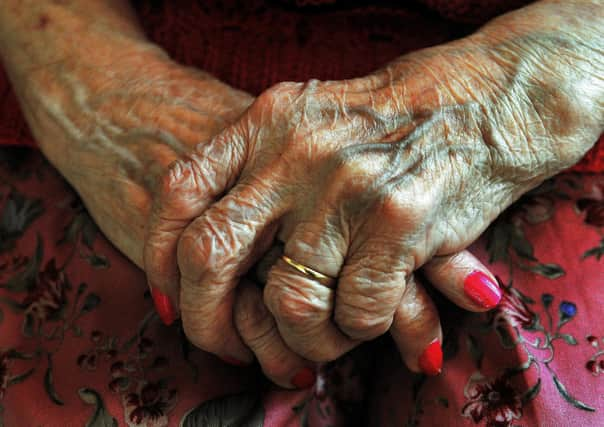Geriatric expert: At present isolation is the only way to protect the elderly from Covid-19


Now there have been over 40,000 deaths in the UK, the country has been in lock down with millions confined to their homes, many with physical and psychological consequences, and the economy has plunged to levels not seen in living memory.
During this time we have learned much more about this new coronavirus, now named Sars-Cov-2 and Covid-19, the disease it causes.
Advertisement
Hide AdAdvertisement
Hide AdOne of the striking features of Covid-19 is its disproportionate effect on older people. A recent report of deaths from Covid-19 in different age groups in Northern Ireland showed the following:


Age, years Deaths
under 20 0
29 – 39 1
40 – 59 63
60 – 79 153
80+ 357
People over age 80 accounted for 62% of the deaths; over 60s were 89%.
This could be due to the infection being more common in older people or more often having a fatal outcome. In the absence of widespread testing it is difficult to be certain which is the case.
The available evidence suggests that, even if there is a difference in the infection rate in young and older adults, old age is associated with a much higher mortality from Covid-19.
Advertisement
Hide AdAdvertisement
Hide AdIt contrasts with the experience of the great influenza pandemic in 1918-19 which killed millions of people worldwide. The exact number will never be known because so many were buried in mass graves.
The highest mortality in this pandemic was in young adults. It has been suggested that this may be because older people in 1918-19 might have been previously exposed to a form of the influenza virus which gave them partial immunity.
No such simple explanation suggests itself for the disproportionate effect of Covid-19 on older people.
Public Health England has reported that certain groups of people, including older people have an increased likelihood of having Covid-19 mentioned on the death certificate.
Advertisement
Hide AdAdvertisement
Hide AdThese include those living in deprived areas, Black and Asian minority ethnic groups and people with medical conditions including diabetes, chronic kidney disease, chronic obstructive pulmonary disease and dementia.
In the general population, all of these are associated with a reduced life expectancy and the medical conditions become increasingly common with increasing age.
Older people in general have a lower resistance to disease and recover more slowly.
This can be thought of as a diminished reserve capacity to cope with any additional stress. Reserve capacity is reduced further by the presence of chronic diseases which are themselves more common in old age.
Advertisement
Hide AdAdvertisement
Hide AdIn older people, the addition of an acute illness such as an infection, which might be a mild illness in a fit younger person, may overcome their remaining reserves and prove fatal.
In the later stages of the pandemic it became known that a large number of older people who were residents of care homes had died from Covid-19.
The residents of care homes for older people are usually among the oldest and frailest people in the community and often have serious medical conditions. Many suffer from dementia with or without physical disabilities. Dementia is a serious, progressive and ultimately fatal condition.
It has several causes, the most common being Alzheimer’s disease, and there is no effective treatment. Dementia causes frailty, increases the susceptibility to other diseases and reduces reserve capacity to cope with these.
Advertisement
Hide AdAdvertisement
Hide AdResidents of care homes are the most vulnerable to infections including Covid-19 and once an infection has entered the care home it will rapidly spread. The virus will have entered the home from outside, such as newly admitted residents and staff. It has been suggested that, at the time when the infection rate was increasing and it was feared that hospitals would be overwhelmed by patients with Covid-19, older patients with asymptomatic Covid-19 may have been transferred from hospitals to care homes.
If this was so, those affected in care homes would join the patients, mostly older people, with cancer, heart disease and other serious conditions whose diagnosis and treatment has been delayed by the hospital service’s response to Covid-19.
There has been discussion of the use of ‘Do Not Attempt Resuscitation’ (DNAR) orders in older people with Covid-19 and other fatal diseases. Some of the discussion has suggested that these orders are based on age, a judgement of the value of the life or the availability of resources.
None of this is true. DNAR orders are based solely on the likelihood of resuscitation being successful. Cardiopulmonary resuscitation (CPR) is a violent procedure lacking any dignity.
Advertisement
Hide AdAdvertisement
Hide AdThis is acceptable when there is a good chance of it being successful. If it is not likely to be successful, it robs the patient of a peaceful and dignified death and it causes distress to the family and other residents and patients.
CPR is most likely to be successful when an otherwise healthy person has an acute heart attack, and skilled resuscitation is close by.
Frailty, other serious illnesses, including dementia, and a non-cardiac terminal illness all greatly reduce the chances of successful CPR.
Similar conditions apply to the decision to admit an older person to an intensive care unit or to use mechanical ventilation. In hospitals and care homes patients and relatives are encouraged to make advance care plans, in consultation with their nearest relatives and their doctor, to indicate their wishes for when these circumstances occur. Everybody should be encouraged to do this.
Advertisement
Hide AdAdvertisement
Hide AdAt present the only way to reduce the number of older people suffering and dying from Covid-19 is to avoid them coming into contact with other infected people, and the only method of doing this is isolation.
Preventing Covid-19 not only benefits the person concerned. It also protects the community from the spread of the infection.
• Robert Stout professor emeritus of geriatric medicine, Queen’s University, Belfast
——— ———
A message from the Editor:
Thank you for reading this story on our website. While I have your attention, I also have an important request to make of you.
Advertisement
Hide AdAdvertisement
Hide AdWith the coronavirus lockdown having a major impact on many of our advertisers - and consequently the revenue we receive - we are more reliant than ever on you taking out a digital subscription.
Subscribe to newsletter.co.uk and enjoy unlimited access to the best Northern Ireland and UK news and information online and on our app. With a digital subscription, you can read more than 5 articles, see fewer ads, enjoy faster load times, and get access to exclusive newsletters and content. Visit https://www.newsletter.co.uk/subscriptions now to sign up.
Our journalism costs money and we rely on advertising, print and digital revenues to help to support them. By supporting us, we are able to support you in providing trusted, fact-checked content for this website.
Alistair Bushe
Editor